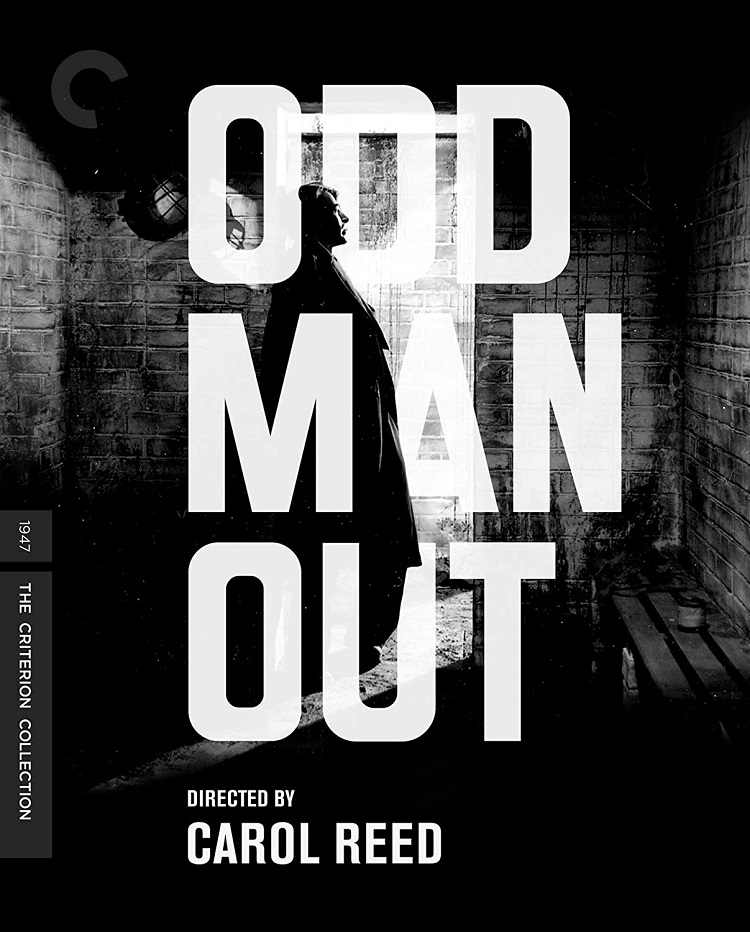
There have been many films about personal and conflicted crisis of conscience, such as American Beauty (1999), The Apostle (1997), and Magnolia (1999). However, as wonderful as these films are, I think that director Carol Reed’s unjustly overlooked masterpiece Odd Man Out, easily outdoes them all, especially because of its subtle and sensitive depiction of ordinary people caught up in a web of troubles. This was one of Reed’s breakthrough films, not just for its deft and thrilling storytelling, but it was also one of the first to address the circumstances of terrorism in human terms. It was adapted for the screen from a novel by F.L. Green.
The story concerns Irish rebel Johnny McQueen (a brilliant James Mason) who is seriously injured from a gunshot wound. Betrayed by his comrades and left for dead, he struggles to find shelter and refuge while Kathleen, his desperate girlfriend, searches all over the city to find him. As McQueen suffers unbearable agony while continuing to bleed from his wound, he spends the last few moments of his life contemplating forgiveness and understanding.
Although Odd Man Out obviously belongs to Mason, whose powerful performance is one for the film history books, the film provides some thoughtful screen time to a wonderful array of supporting players, such as W.G. Ray (displaying great warmth and thoughtfulness) as Father Tom; Robert Beatty as Dennis (whose scene of trying to escape the police on an over-populated train is a moment of dark comic genius); and Kitty Kirwan as the resourceful Granny, who helps Kathleen hide a gun and bandages while the cops search through their once peaceful home. Special praise and acclaim should be presented to Kathleen Ryan, whose quiet stoicism truely matches Mason’s physical and emotional intensity. Her work as the character Kathleen is a remarkable portrayal of brave devotion and love during very grim consequences.
The acting isn’t the only reason why the film remains one of the sublimely gritty classics of cinema. The crisp and shadowy cinematography by Robert Krasker keeps the tension fluid and high throughout the entire production. The score by William Alwyn is tinged with a sincere amount of tragic sadness, which helps increase the realism of the film.
Speaking of the praise and acclaim, Odd Man Out was nominated for an Academy Award for Best Film Editing. It also garnered Reed a Grand International Award nomination at the Venice Film Festival. It won the BAFTA award for Best British Film and the National Board of Review Award as being one of the top 10 films of 1947.
The supplements for the new Criterion release include:
- New interview with John Hill, British cinema scholar and author of Cinema and Northern Ireland: Film, Culture and Politics – an informative examination including the political occasions that enlivened Odd Man Out, vital contrasts between the original novel and the film itself, and a percentage of the considerable areas where the film was shot.
- Postwar Poetry – a new short piece centering on the production history of Odd Man Out, the original source novel, the visual style of the film, and the personalities of the characters with the struggles they face. It also includes valuable input from film historians Charles Drazin, Peter Evans, and Tony Rayns. Directors John Boorman and Guy Hamilton also add their reflections to the brilliance of the film.
- Home, James – a nostalgic and poignant documentary about James Mason’s hometown of Huddersfield where he travels back to reminisce about growing up there. It is a great look at Mason revealing a different side to himself than he wanted to in his iconic career.
- New interview with music historian Jeff Smith, author of The Sounds of Commerce – a brand new piece where he talks about composer William Alwayn’s life and career, and especially the unusual score for Odd Man Out.
- Radio adaptation from 1952 – this thrilling interpretation of the film starred Mason, Pam Kellino, and Dan O’Herlihy and was produced by Elliott Lewis. I love these radio broadcasts, and I hope that Criterion continues this trend, especially with the classic films like they did with The Palm Beach Story and The Third Man.
Rounding out the release is a wonderful essay by Imogen Sara Smith, as she goes into great detail about why Odd Man Out is such an unique film in the history of cinema. In terms of film essays, this is a really worthwhile read.
So, if you have never heard of Carol Reed’s body of work, you should watch this stellar film, along with The Third Man, The Fallen Idol, and Night Train to Munich.